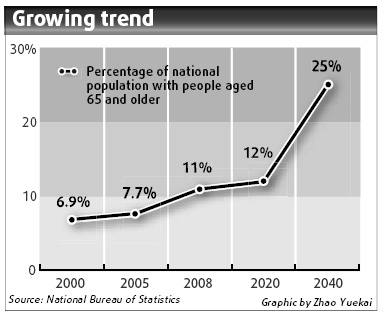Top Biz News
Aging seniors facing life without proper care
By Shan Juan (China Daily)
Updated: 2009-12-30 07:48
 |
Large Medium Small |
Nursing home woes
With a monthly pension of 2,200 yuan ($322), Li, if she wants, can afford to live in a mediocre nursing home in her city.
However, for a great number of seniors, especially those in rural areas, they are not able to afford such facilities, which cost at least 1,000 yuan a month in the country, Yan said.
Nursing homes, both government and privately owned, are business oriented and open to those who can afford to pay.

"They are providing quality services to the already well-off seniors while not helping the poor and needy," said Wang Zhenyao, director of the social welfare and charity promotion department in the Ministry of Civil Affairs.
"It's right to have them both," he said.
State-owned nursing homes, largely subsidized by the government, should be public goods and obliged to help the poor with basic care and support, Yan said.
In developed countries like the United States, 5 percent of seniors live in nursing homes.
Currently in China, with all beds in such facilities taken, it is just 1 percent.
A lack of effective management and supervision has also been noted in nursing homes in China, Yan said.
In April, a private nursing home in Changchun, capital of Jilin province, was found abusing their residents, reports said.
Investigations showed the nursing home was not registered with the government.
In fact, due to legal loopholes, two-thirds of the nation's nursing homes are operating without registration, Yan said.
"Without registration there is no supervision at all," he said.
Even registered ones are usually short staffed and in great need of professional workers who can provide help for disabled seniors, he said.
By the end of 2008, the country had 30,000 of such certified workers, while at least 10 million of them are reportedly needed.
Way out
As China faces an aging society, the government should work out a feasible social welfare and care system to benefit everyone in the nation and help improve social harmony and mend social conflicts, urged Wang.
"With high-speed economic growth for three decades, China is now able to take good care of its seniors," he said.
"To support the old is to respect human dignity. And taking care of the old is no more just the duty of the children," he said.
|
|||
"That will put pressure on the unsound social welfare system of China," Wang said.
In response, the government has kept expanding pension coverage in the country, where quite a few people have no pension at all.
The Ningxia Hui autonomous region in December began giving a basic monthly living allowance to local residents older than 60 who had no pension and faced financial difficulties, reports said.
Wang also urged the central government to speed up building a community-based care system to make sure 90 percent of seniors receive care at home, 6 percent are looked after in their communities, with the remaining 4 percent live in seniors homes.
However, he conceded that current community planning in China does not give much thought to older residents.
"We should start building our seniors a 'Noah's Ark' within the communities," he said.













